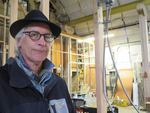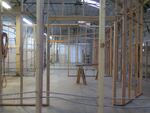Portland, city of makers, draws identity on its creative community, from craft beers to indie rock to zines.
But amid the city’s booming real estate market, tech industries and other signs of change, Portland’s artists — and the creative spaces they have come to call home — are being squeezed out.
Susan Harrington is a full-time painter. She used to have studio space at the storied Towne Storage warehouse. She was forced out, alongside dozens of other artists, when the building was sold for a high-priced office and condo development.
Harrington learned that market prices had risen to twice the amount she had been paying. But she was able to find a haven thanks to Ken Unkeles.

Ken Unkeles at NW Marine Ironworks at an early stage of renovation.
April Baer / OPB
Unkeles' father was in the box and packaging business.
“I grew up kicking tires at old warehouses," he said. "In grade school, we looked at warehouses to buy.”
As he took over the family business, Unkeles shifted its focus, thinking less about finding space to put boxes and more about space itself as a commodity. He kept his eyes open for industrial spaces for sale, in hopes of leasing to industrial tenants.

The second phase of renovation for creative spaces at Ken Unkeles' property at the NW Marine Ironworks.
April Baer / OPB
Then came the day, in 1992, when an artist offered Unkeles $200 for a corner of his warehouse.
“Two-hundred dollars was more than I made in a year off that space,” Unkeles said. “To me, I was really stepping up.”
Whispers of affordable artist warehouse space spread like wildfire in the creative community. Before long, Unkeles was fielding more calls from artists than he was from industrial businesses. His North Coast Seed Studios on Albina are a hive for makers across disciplines, from painters to ceramic artists to evolving digital art practitioners. All five of his buildings, concentrated in the gritty north end of Portland, always carry a waiting list.
“For the last 10 years there’s been demand that I can’t fill,” Unkeles said. “I don’t get a day without a phone call of somebody I can’t help.”
He gave us a tour of one space he redeveloped over several years, the NW Marine Ironworks. Artists like Susan Harrington pay between $175 to $1,000 per month (size depending) for brightly lit workspaces with electric and heat.

Artist Susan Harrington in her studio at NW Marine Ironworks.
April Baer / OPB
Still, getting old buildings into shape can be pricey. Inserting a second stairway in one building of the NW Marine Ironworks cost more than Unkeles paid for the entire complex in 1992. And an even bigger hurdle awaits during renovation: the city's permitting system.
“Working with the city has become challenging,” Unkeles said. He laments the increasing rules and restrictions. “The city used to accommodate what I did. It even had a designated occupancy specialist whose job it was to make things work.”
Unkeles’ secret weapon was Suzanne Vara. Hired in the early 1980s by Portland’s Bureau of Development Services as an occupancy specialist, Vara came into her own at BDS as a small business liaison. Her job was to work with individuals and very small businesses — the people unable to hire architects to shepherd projects through the complicated permitting process. She would flag problems in blueprints, make site visits and work on small business owners’ behalves on appeals that suffered from too much red tape.
“I got to say, ‘See that step?’ Someone’s going to trip and kill themselves on that,” she said.
Customers could get her advice early, and make a building plan that was both safe and viable. Portland city Commissioners Nick Fish and Chloe Eudaly's 24- point proposal for preserving creative space suggests re-creating Vara's role, to help people like Ken Unkeles carve out affordable space for creative work.
Unkeles acknowledges that with rising real estate costs and fewer spaces for creatives, artists will leave Portland, depriving the city of what was once at the core of its identity: “I think if Portland doesn’t pay attention, we’ll lose these people. People on the lower end are starting to look elsewhere. How can they not?”
To that end, Unkeles is renting almost exclusively to artists these days, knowing that much more than a couple square feet of building space is at stake.